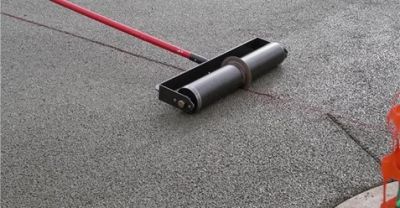Difference between revisions of "Joint cutting"
Jump to navigation
Jump to search

(Created page with "400px|thumb|right| Cutting joints with a "pizza cutter". (Concrete Network, 2022)<ref> Concrete Network. 2022. Permeable Concrete Pavements. Photo. Accessed August 13 2022. https://www.concretenetwork.com/pervious/ </ref> Pavement joints are important in permeable concrete systems to prevent the pavement being cracked and moved. These potential problems are caused by water, ice, salt and loads on the pavement surface. '''Construction Steps:'...") |
(No difference)
|
Latest revision as of 14:20, 22 September 2022

Cutting joints with a "pizza cutter". (Concrete Network, 2022)[1]
Pavement joints are important in permeable concrete systems to prevent the pavement being cracked and moved. These potential problems are caused by water, ice, salt and loads on the pavement surface.
Construction Steps:
- Ensure joint pattern and width match drawing details. According to the (American Concrete Institute (ACI), 2013)[2], “minimum joint width for saw cutting is 3 mm”.
- Cut the joints on the pervious concrete surface immediately after the concrete is rolled/compacted.
- Alternatively, sawcut concrete after concrete has solidified enough to avoid removing aggregate material from the concrete pavement.
Key Inspection Points:
- Use of appropriate equipment
- Right width and depth
- ↑ Concrete Network. 2022. Permeable Concrete Pavements. Photo. Accessed August 13 2022. https://www.concretenetwork.com/pervious/
- ↑ ACI. 2013. ACI 522.1-13 Specification for Pervious Concrete Pavement https://www.concrete.org/store/productdetail.aspx?ItemID=5221U13&Format=PROTECTED_PDF&Language=English&Units=US_Units